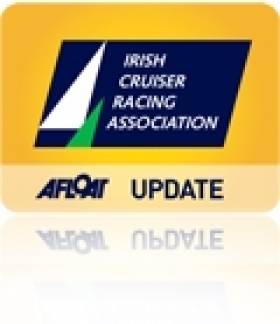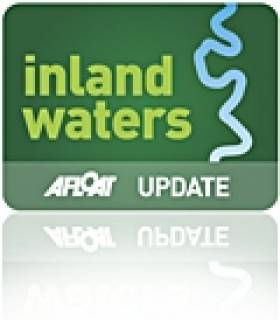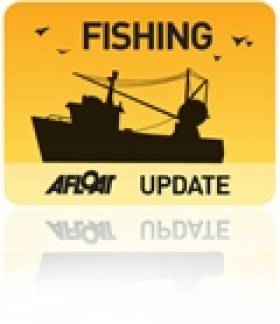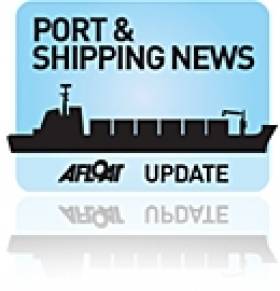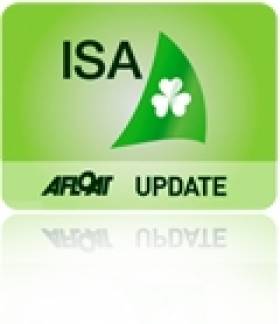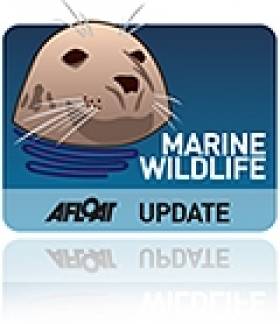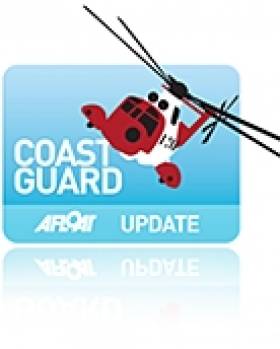Displaying items by tag: Conference
ICRA Heads to Galway Harbour for 2014 Annual Cruiser–Racer Conference
#cruiserracing – Buoyed up by yesterday's news that Irish Commodore's Cup yacht Antix (Anthony O'Leary) won the Royal Ocean Racing Club's Boat of the Year award in London, the annual cruiser racing conference staged by ICRA heads to Galway harbour on Saturday. The annual conference, open to all sailors, inlcudes nine presentations including a special Commodore's Cup presentation by ICRA's winning team.
The conference line up also includes a focus on handicapping and an insight into the local ECHO system and, say ICRA, just how powerful the system is when used properly.
There will also, no doubt, be a lot of chat about next season's headline events not least ICRA's own 2015 National Championships that will be run in conjunction with the Sovereign's Cup.
Other major cruiser-racer events next year are:
Dun Laoghaire Dingle 12 June
Volvo Dun Laoghaire Regatta 9–12 July
WIORA 22–25 July
Calves Week 4–7 August
The conference will be held at the Harbour Hotel in Galway from 10:30 – 16:00. It concludes with ICRA's own 'Boat of the Year' presentation.
First 'Our Ocean Wealth' Conference Set For Next Month
#OurOceanWealth - The Marine Co-ordination Group at the Department of Agriculture, Food and the Marine has announced the first annual Our Ocean Wealth Conference taking place next month.
The conference will be held at The Printworks in Dublin Castle on Wednesday 18 June and will focus on the promotion of growth and jobs, providing a forum for the State - in association with the marine community - to review the progress in implementing Harnessing Our Ocean Wealth: An Integrated Marine Plan for Ireland.
For further information and registration visit the Our Ocean Wealth website at www.ouroceanwealth.ie.
World Canal Conference to be Staged in Milan
#canal – The 27th World Canals Conference, previously staged in Ireland, will be held at the Lombardy Region 'palace' in Milan from September 1-4. The conference offers a unique opportunity to meet key players in a wide range of developments on canals and rivers, from the smallest canals in historic city centres to high-capacity waterways needed for Europe to maintain her industries and survive world competition.
Italy is at the heart of contemporary trends in both areas, with ground-breaking projects on Milan's historic canals, as well as major investments currently under way or planned on the Ferrara waterway, the river Po and two canals - Venice-Padova and Milan-Cremona-Po - that have been left incomplete for 40 years!
Drogheda Hosts North Atlantic Salmon Conference
#Fishing - Drogheda is hosting the 30th annual meeting of the North Atlantic Salmon Conservation Organisation (NASCO) this week till Friday 7 June.
The prestigious fisheries conference will take place in the Westcourt Hotel and will be attended by delegates from Canada, Denmark (in respect of the Faroe Islands and Greenland), the European Union (representing its 27 member states), Norway, Russia and the USA.
Welcoming the conference to Drogheda on Tuesday 4 June, Minister Fergus O’Dowd said it "will continue the key work of NASCO, using the best scientific information, and international co-operation to conserve and manage Atlantic salmon populations.
"I wish the many delegates a friendly and intellectually stimulating stay in Drogheda where the meeting programme will no doubt provide insights and an outstanding platform for dynamic networking to ensure the continued conservation of our precious salmon stocks."
Based in Edinburgh, NASCO is an international organisation established by an intergovernmental convention in 1984. Its main function is to conserve, restore, enhance and rationally manage Atlantic salmon through international cooperation taking account of the best available scientific information.
NASCO is the only intergovernmental organisation with this mandate, which it implements through international consultation, negotiation and co-operation.
Ireland is at the forefront of salmon conservation internationally, according to Inland Fisheries Ireland, which adds that Irish participants at the conference include a Government delegation of managers and scientists and representatives of a number of Irish-based NGOs, including Salmon Watch Ireland.
The cross-border Loughs Agency, which has responsibility for salmon conservation and protection Foyle and Carlingford Loughs, will also be represented as part of the Irish delegation.
Paris To Host Shortsea 13 Convention
#Shipping - The European Shortsea Conference will take place for the first time in France on Thursday 14 March 2013.
Shortsea 13 at La Defense in Paris is organised by the Bureau de Promotion du Shortsea Shipping (BP2S) and SPC France jointly with other European Shortsea promotion centres - and comes just weeks after the Euromaritime exposition that kicks of tomorrow in the French capital.
The conference will cover a number of hot topics related to shorts and intermodal intra-european transport, the challenges that exist and are yet to come, and what solutions can be found.
And like last year's event, hosted in Dublin by the Irish Maritime Development Office (IMDO) and Coastlink, the convention will provide a platform to network, discuss and debate issues shared by European shipping partners.
Organisers say that contributors are still welcome to take part as speakers (e-mail [email protected] for more) or sponsors (contact [email protected] for details).
Registrations will open soon for those wishing to attend as delegates. Keep an eye on the Shortsea 13 blog or find more information on the European Shortsea Network at www.shortsea.info.
New Workshops For 7th ISA National Conference
#ISA - The ISA Dubarry National Conference is back for its seventh year with even more exciting and interesting seminars and workshop than ever before.
Taking place on 2 March 2013 at the Royal Marine Hotel in Dun Laoghaire, the conference is open to all with an interest in sailing, windsurfing and powerboating and is free to all ISA members.
A total of 20 interactive seminars and workshops will run throughout the day covering five different themes: Marketing and Events; Funding and Initiatives; Training; Race Management; and High Performance.
Whether you're involved in your club at committee level, you work in or run a training centre, you are involved in race management or are just a sailor looking to expand your skills and knowledge, there will be a range of diverse topics to suit all interests.
New for 2013 is a High Performance stream specifically for sailors with an interest in racing and performance. ISA team physic Mark McCabe will deliver a no-nonsense workshop on Strength & Conditioning followed by ISA team psychologist Kate Kirby who will discuss how mental factors can influence performance.
And Olympic 49er sailor Matt McGovern will talk about the highs and lows of London 2012 and how it has prepared him for his Rio 2016 campaign.
The conference is free to all members of the Irish Sailing Association but you must register in advance. Download the conference timetable and register online HERE.
Newtownards To Host RYANI Instructor and Coach Conference
#RYANI - Newtownards Sailing Club will be hosting this year’s Royal Yachting Association Northern Ireland (RYANI) Instructor and Coach Conference.
The conference on Saturday 16 February is aimed at RTC principals, RYA instructors and Volvo Champion Club coaches and co-ordinators.
Topics to be covered include Racing Rules of Sailing rule changes for 2013-2018 and a national update on activity by the RYA throughout the year.
The event also has an allowance for on-the-water activities, with a chance to pick up some new ideas for training in sailing and powerboating in the afternoon.
Meanwhile, Sunday 17 February will see various courses taking place throughout the day, including in first aid and SRC/VHF certification, as well as a club mark laying course for RYA members.
This half-theory, half-practical course will give an introduction to mark-laying which includes basics like how an anchor works plus techniques to stream marks, lay level gate marks and spreader marks, and a short section on signalling.
Details on booking your place at the Saturday conference and on the Sunday courses are available at the RYANI website HERE.
UK Conference to Uncover Secrets of the Irish Sea
#MARINE WILDLIFE - A marine wildlife conference in Cumbria aims to delve deep into the Irish Sea to uncover some of its fascinating secrets.
The Living Seas North West Conference takes place at the Netherwood Hotel in Grange-over-Sands next Friday 19 October and presents an opportunity to discover the diversity of wildlife we have in the Irish Sea – a magnet for hundreds of species from huge basking sharks to tiny molluscs and many varieties of birds.
“The Living Seas North West conference is a chance to learn more about the Irish Sea – what’s in it, what activities go on, what impacts these have had, how it was managed in the past, how it is being managed now and how can we approach its management in the future,” said Cumbria Wildlife Trust marine conservation officer Lindsay Sullivan.
World renowned ocean expert Professor Callum Roberts and explorer, naturalist and TV personality Paul Rose will be among those giving talks on the day, and there will also be discussions hosted by experts from around the UK and Ireland on topics from offshore development and fishing to coastal zone management.
And for anyone aspiring to a career in the marine or coastal environments, the afternoon careers session will introduce them to seasoned experts offering their views on how to land your dream marine job.
The Living Seas North West Conference, hosted by the Irish Sea Wildlife Trusts, runs from 9am-5pm on Friday 19 Octover. Admission is £35 per person (#15 for under-25s and students) and includes a buffet lunch, tea and coffee, and a full delegate pack. For further details visit www.irishsea.org.
Cork Hosts Conference on Maritime Crime
#MARINE CRIME - TheJournal.ie reports that investigators the world over are gathered at the Silver Springs Moran Hotel in Cork for a conference on maritime crime. Scroll down for photos of the event by Bob Bateman below.
The International Association of Marine Investigators conference - now in its 15th year - will be discussing topics from drug imports to accident reconstruction.
The full conference agenda is available to read or download HERE.
The I.A.M.I, (Irish Association of Marine Investigators) Conference moved this morning to the premises of Marine Motors, Passage West Co. Cork, where they were welcomed on behalf of Passage West Town Council by Councillor Marcia D'Alton who gave the delegates a very interesting address on Passage West and it's long history of Maritime Associations. She also spoke of the relationship with the first steamship to sail the Atlantic from Passage West under Captain d'Esterre Roberts one of whose direct descendants, Grattan d'Esterre Roberts was also present. Also in attendance were Gerry Greenway, Manager Revenue Maritime Operations, Kevin Higgins of Marine Motors, Michael O'Donovan of Oysterhaven Boats and Robert Kennedy of O'Leary Insurance Insurances Ltd.
Sergeant Liam Grimes of the Garda Water Unit explained the hugely important function of the Association and the co-operation and exchange of information that exists throughout Europe between European Marine Police Units and European Marine Insurance Investigators in their endeavours to combate the ever escalating theft of boats, engines and all marine equipment. Their presentations and methods of detection explained were most interesting to listen to.
The Conference consists of workshops and presentations from all units including the Garda water unit. The Water Unit incorporates the Garda Sub Aqua Unit and this year alone attended the Volvo Ocean Race at Galway, the Tall Ships Race in Dublin and Cork Week to name but a few. They attended events right around the coast and are now based in Athlone. The Conference was opened yesterday at Silversprings Moran Hotel by Cork Chief Superintendent Tom Hayes. It is thefifteenth Annual Conference of the Association and the first to be held in Ireland and by all accounts has proven to be highly successful and enjoyable. It concludes this evening with a function at Silversprings Moran Hotel.
Additional reporting by Claire Bateman
Unified EU Coastguard On The Cards
#COASTGUARD - Greater co-operation between Europe's coastguard organisations is inevitable, according to the Irish Coast Guard director.
Chris Reynolds was speaking at Search and Rescue 2012, the EU Heads of Coastguard conference in Dublin last Thursday, at which he outlined a feasibility study being conducted by the European Commission on a standardised coastguard service across Europe.
As Shephard Media reports, Reynolds admitted that some challenges stood in front of any effective change in the sector, noting that SAR policy at member state level is often spread across many departments.
But the Costa Condordia disaster off the Italian coast recently may focus governments to develop a "sense of urgency" on the issue, he said.
In the keynote address at the conference, Italian coastguard chief Giuseppe Troina said it was fortunate that the death toll in that incident had not been much greater, emphasising that more than 4,000 people survived the cruise ship's sinking.
The Irish Times has more on the story HERE.


























